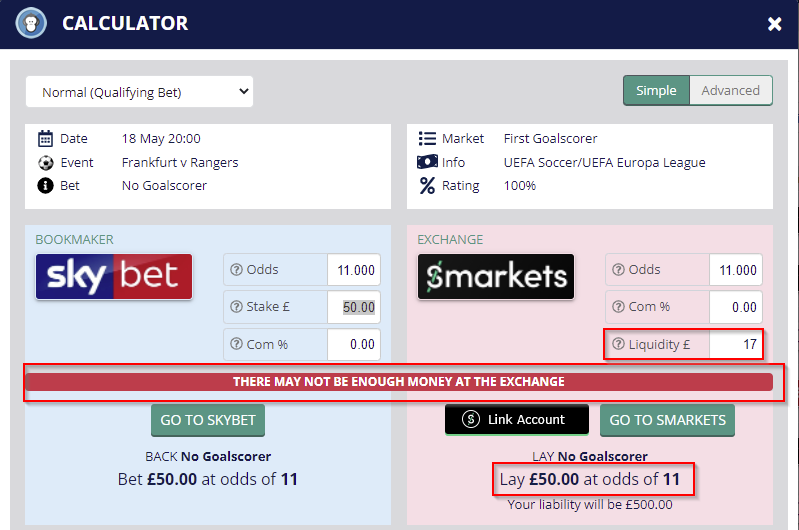Liquidity is the amount of money available in a particular market.
At the exchange, when you look at the odds, you’ll see a figure in £. This is how much is available to trade on that market at that particular time. This figure is very important as it will tell you if there is enough money for you to place your bet and for it to be fully matched.
Let’s Discuss in More Detail


Once you’ve entered all your figures into the relevant calculator and given a Lay stake, you then need to check that the liquidity in the market covers this Lay stake. I’m emphasising on Lay stake as this is not to be confused with your liability (the amount of money you need to have in your exchange account).
If the calculator gives you a Lay stake of £15.20 for example and there is only £10 liquidity in the market, then your bet will only partially match. If your Lay stake is £15.20 and the liquidity in the market is £129, then this will more than cover it and your bet should fully match.
‘The liquidity in the market needs to be the same or more than your Lay stake’
So, it is very important to check the markets before you bet on them. There is a column called ‘availability’ in the oddsmatcher or pop up calculator that should assist. This will tell you what liquidity is in that market at that time of checking. This is also useful when using the integration tool.


As a general rule, try to bet on high profile events as this is where the most liquidity is. Other matched bettors and punters will be placing bets on these so there will be plenty of funds in circulation. These markets include the win market for major league football or ITV/feature races etc. It’s important to note that the closer you bet to the start of an event, the better the liquidity will be. If you try to place bets days before, it's very common to not see much financial activity.
If you’ve place a bet and didn’t check the liquidity and have an unmatched or partially matched bet, this is absolutely easy to fix. Here is a guide on how you can do so here.
You’re probably wondering where this liquidity comes from. This comes from other bettors like you. Because we’re focusing on the Lay side in matched betting, we rely on people who place back bets to open up a trade for us to place a Lay bet. For example, if Tom, Joe and Dave, each place a bet of £10 on Arsenal to win, this gives us £30 in liquidity on the Lay side to be able to bet against Arsenal.
The liquidity is constantly changing as people place back and lay bets so the amount of liquidity changes accordingly.
If there is £150 in liquidity, for example, and we have a lay bet of £25, you’ll see the liquidity drop to £125 after our bet is taken.
Do note that the exchange operates on a first come first served basis so the first people in the queue to Lay their bet will get priority to that liquidity. You won’t know where you are in the queue as everything happens so quickly but do make sure to give it a moment to match and refresh the page to make sure your lay bet was fully taken.
So in summary, liquidity is crucial in matched betting. Without any funds being traded at the exchange by Back bettors, then we simply can’t Lay our bets. The pink box at Betfair will look 'blank' and Smarkets will say ‘ASK’. This means that these markets have zero liquidity.
You can always check other exchanges if one exchange's liquidity is low but they all generally work the same way.
Liquidity is never guaranteed as they change all the time as Back and Lay bets are placed so it’s important to check availability before placing any bets and know how to rectify any situations when your bets may not fully match.